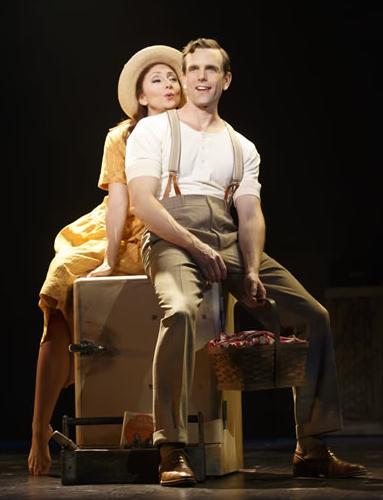Literary Sugar of ‘Bright Star’: We Want Some More
By • January 4, 2016 0 1302

There’s going to be some folks that are going to cry foul when it comes to “Bright Star,” the folksy, new and pre-Broadway stage musical by Steve Martin and Edie Brickell. Sentiment—honest or otherwise—isn’t too popular with contemporary critics armed with sugar repellent these days.
When it comes to “Bright Star,” I’m not in that camp. If this be sugar, then give me some sugar.
“Bright Star,” which does indeed traffic in honest sentiment, fable-like story-telling, improbabilities, foundlings, homespun Americana-style music fueled by banjos, guitars and fiddles, attractive heroes and heroines, down-home small-town Southern types and a blissful embrace of a satisfying end to a nostalgia-doused story, seems in the old-fashioned telling and the sparkling playing and singing to be that rare bird with plumages so familiar that it seems brand new.
Now playing at the Eisenhower Theatre at the Kennedy Center through Jan. 10 before a planned Broadway run, “Bright Star” has a lot going for it, notably a notable star with a big Broadway star voice and demeanor in Carmen Cusack. (She was Nellie Forbush in a road production of “South Pacific” a few years back as well as the green witch in “Wicked.”)
Cusack stars as Alice Murphy, whom we first see as a tough-minded editor of a North Carolina literary magazine, appraising the works of a young writer just returned to his hometown from the war—World War II at that. She finds his work has possibilities and admires his chutzpah for presenting a letter recommendation from Thomas Wolfe, the outsized North Carolina representative in the Great American Novelist Derby who had been dead for several years at the time.
The writer is Billy Cane who comes to find his mother has passed away. He yearns to be a writer, uses dictionary and thesaurus words and writes with feeling and a poetic sensibility. But this isn’t just Billy’s story—it’s also Alice’s who has a secret past that includes a teenage love affair with the son of a prominent banker in her home town. There is a certain amount of predictability in this truth and consequences scenario, but its spun out with such panache, such energy, spurred on by songs and music by both Martin (an acclaimed banjo player as well as movie star and comic) and Brickell, a noted singer and song writer who’s also the wife of Paul Simon.
The action takes place in North Carolina over the 1920s, 1930s and post-war America in a South that’s a kind of fable—no white sheets here or Jim Crow here, just small town folks trying to find themselves, live their lives, do what they’re meant to do, fall in love and find a measure of it somewhere, sometime, even if it takes some coincidental doing, and a long time.
I say it’s a fable—because who could believe this story and who couldn’t want to believe it at the same time—but it’s an odd sort of fable nonetheless. A band of musicians play the songs from inside a small house, which doubles as a store, home, almost anything at all, transporting music and musicians as if they were in a dance, which they sometimes are. The songs drive the story, assess it, give it bounced and hope, and meaning, reveal character—“A Man’s Gotta Do” by the ostensible villain of the piece. The beat is bluegrass, folk, by reeling in memories of Pete Seeger, Woody Guthrie, the Seldom Scene, and the like. It’s music played and sung with great skill, especially by Cusack who sings the stirring and sweet “Sun’s Gonna Shine” and others. A.J. Snively as Billy Cane and Paul Alexander Nolan make spirited and heroic figures.
“Bright Star” is especially striking and not a little startling because its heroes and heroines are literary types. Alice is a knowing, skillful editor of the type that existed in Southern literary magazines of the period as well as in New York, and Billy could pass for any number of Southern writer wannabes, including Thomas Wolfe himself. Its subject—find yourself and your identity—is played against the background of a South both rustic and literary at a time when the idea of Southern literature was no small thing—think of William Styron, Wolfe Allan Tate, Truman Capote, Tennessee Williams and Carson McCullers to name a few. It’s not every day these writers are the table talk and story contents of a Broadway musical.

